
January 7, 2010
 CR Holiday Interview #17—Grant Goggans On 2000 AD
CR Holiday Interview #17—Grant Goggans On 2000 AD

 Grant Goggans is the Hipster Dad
Grant Goggans is the Hipster Dad. Although he's the newest person participating in this series in terms of my reading his work regularly, Goggans has already impressed me with the certainty of the relatively straight-forward approach he employs. Grant Goggans does the heavy-lifting required to make himself a stopping point on-line without anyone in particular calling attention to what he does. He grabs comics with both hands. Goggans has a particular passion for the comics spinning out of the UK's long-running
2000 AD. I'm fascinated by a lot of those comics myself, their constant cycle of not quite ever getting over with US audiences, so it seemed a perfect topic for discussion. -- Tom Spurgeon
*****
TOM SPURGEON: Grant, you're an Internet discovery for me, and I know absolutely nothing about you. Could you talk a bit about how you went from reading comics to writing about them, your basic comics resume? Are you a dad? Are you a hipster?
GRANT GOGGANS: I was probably never really a hipster, although I have read all the required music magazines, own lots of vinyl, lived for years in a college town (the
best one,
Athens) and spend most of my music money at independent record stores. Yet I never really went out enough to develop a really refined sense of scene snobbery. I missed almost all the early days of
the Elephant 6 collective, and
Cat Power's booze-ups, because I was happier staying in and watching
Homicide: Life on the Street, really.
I am certainly a dad, and from 2003 to 2008, I was raising my two wonderful children by myself. One Saturday in 2004, we made the usual trek from suburban Marietta, where we live, down to Decatur to buy
PJ Harvey's album Uh Huh Her from
Wuxtry Records. A girl who worked there for a time teased me about my situation, handing the album across the counter while my daughter bawled for
Jake's Ice Cream, and gave me the nickname "Hipster Dad." I'd like to think she was just being playful, although the name "hipster" has certainly taken on a pretty awful reputation. I love it, though I think it made several of my friends cringe when I adopted it.
I started blogging in December 2000 to promote my own comic. From 1998-2003, I wrote and drew
The GMS Legion, an office-photocopier book which was inspired by classic
LSH fandom and a desire to do a 1980s period piece set in high school. It was an update of notebook paper comics I did when I was 12. I was never at all successful, nor particularly good, but I did 13 issues, each 80-100 pages long, and did a couple of short strips for the first few
Fluke anthologies before the reality and demands of single fatherhood and full time work got pretty heavy and I packed it up.

I joined LiveJournal in June 2001 and immediately cajoled everybody I knew to get one as well. Very few of them still use it regularly. In the fall of 2004, I started doing the features which became my old "Weekly Comics Hype," trying to push DC's short-lived line of
2000 AD reprints whenever there was a new one out, or some other easily-purchased comic or collection whenever there wasn't. I've had a lot of luck with that, and several friends and readers who haven't read comics since they were kids have told me they've enjoyed trying the books I recommend.
A couple of years ago, during some incident when LJ was sold to the Russians or something, there was talk that it might shut down. LJ was my only real web presence or social media, so I decided to branch off into separate sites on blogspot.
I have
The Hipster Dad's Bookshelf for all my book and comic reviews and try to update it at least twice a week.
Reprint This! is updated twice a month and it rotates between a celebration of an out-of-print property and a follow-up article, usually with a review of an archival reprint and a bit of news about forthcoming collections.
Thrillpowered Thursday is a weekly
2000 AD blog, but I'm actually taking a break from that for a couple of months while I work on a guide to the library of
Doonesbury books, and reread as much of that as I can. I hope to have this new blog at least started before the end of January.
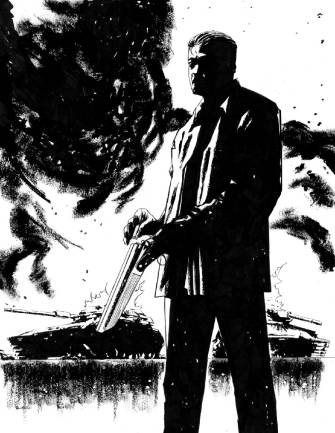 SPURGEON: Your most appealing choice to me was
SPURGEON: Your most appealing choice to me was 2000 AD
. That's not only an enormous work covering thousands of pages this decade, it's a series in which you seem to have a phenomenal and fervent interest . So I guess my first question would be how did you start to build your current level of interest in the magazine, have you personally been reading it for a very long time?
GOGGANS: I have been a loyal squaxx dek Thargo since 1986, actually. I was very lucky to have a best friend, Dave Merrill, who now lives in Toronto, during that awful period when you're 15 and realizing that
Marvel Comics aren't fun anymore. He had already graduated to books like
Zot! and
Flaming Carrot and
the Eagle Judge Dredd reprints, books I'd never have considered reading as my superhero fandom ebbed. If he hadn't been around to say "No, you don't need to read
Secret Wars II, you can read this instead," I'd have probably dropped comics entirely.
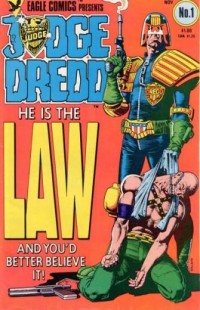
I liked those Eagle
Dredd reprints a lot, even if those great covers by
Brian Bolland looked so much better than the poorly-colored, re-sized artwork inside. Eventually I found proper thrillpower in its raw, original form, and it blew my mind. Lots of the Atlanta-area comic shops carried back issues of
2000 AD then, even if none of those stores --
Oxford,
Dr. No's,
Titan -- seemed to have a consistent run of them. I think every time I went to any of them, I'd find a new back prog that I needed. Of course, I was pretty broke all the time even by the standards of a teenager in the 1980s, so I could only afford to build my collection very, very slowly.
(You know, it's just occurred to me that all of those stores I mentioned are still around after more than a quarter of a century! Oxford's not as fun as it once was, while Titan Games & Comics has really become a very good chain, but still, 25 years in this market, they must all be doing something right, huh?)
There's something about
2000 AD's classic format, the "bog roll" newsprint as it's called, that was so appealing to me. I guess it seemed so esoteric, having all of these wonderful worlds and all that terrific artwork in such a fragile delivery system. Even the advertisements for these odd foreign products like Weetabix, Spectrum computers and records by Alien Sex Fiend kept me captivated. I also fell in love with the silly affectation of a "Command Module" of Betelgeusians in boiler suits and creator droids assembling the comic, so even as the quality of the content dipped for a few years in the early '90s, I kept reading because it was so different and so much fun.
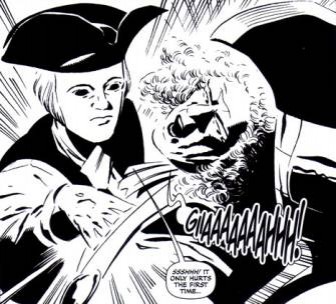 SPURGEON: How have the years 2000-2009 treated
SPURGEON: How have the years 2000-2009 treated 2000 AD
? Are there two or three efforts within its pages you can point to as personal highlights? Do you have a take on how this era of the magazine is different than previous ones?
GOGGANS: I think it's been an excellent decade for the comic. There were lots of ownership and editorial upheavals through the 1990s, but
2000 AD has been owned by
Rebellion for a decade, and has had a single editor,
Matt Smith, since 2002. Maybe the late '90s were a little wilder, when
David Bishop was editor and throwing something new and weird at the wall every third week to see what would stick, but Smith's been a spectacular Tharg and really brought strong consistency to the comic. You just get some exceptionally high-quality SF every week.
Smith's really worked at developing talent, which is one of
2000 AD's most important missions, and giving them room to create series and serials which can interlink and form intricate little comic universes.
Ian Edginton gradually let us see that the worlds of his pirate adventure
The Red Seas (drawn by
Steve Yeowell) and the Victorian crime drama
Stickleback (drawn by
D'Israeli) are the same, and
Si Spurrier did something similar with a wild, downbeat future war serial called
The Vort (also drawn by D'Israeli), surprising us with the revelation that it's set in the universe of his cranky, robot-shagging, torturer-for-hire
Lobster Random, which is drawn by
Carl Critchlow. The most recent run of
Robo-Hunter, which is a firm favorite, features the granddaughter of the original character.
Another really nice benefit to the comic affording so much freedom to its creators is that they can take breaks and come back fully charged.
Robbie Morrison took a very long time off from
Nikolai Dante while
he wrote The Authority for Wildstorm, and it came back better than ever. In a perfect world,
Nikolai Dante would get deserved accolades from everybody as the best comic of the decade. When Simon Fraser returned as the artist, I punched the air and was accosting strangers in the street to tell them the good news.
The other thing that really defines
2000 AD in the decade, to me, is the resurgence of
Pat Mills. His work in the 1990s just didn't appeal to me, for a number of reasons. I'm just getting into his return in my Thrillpowered Thursday blog, but basically what happened is that he had some disagreements with Smith's predecessor as editor,
Andy Diggle, and left the comic in 2001, focusing on publishing in France.
Smith lured Mills back, and unfortunately he brought
Slaine with him. (That and
Dan Abnett's
Sinister Dexter, both of which I once enjoyed, are the two strips which
2000 AD could cancel forever and I wouldn't lose a minute of sleep.) But Mills also created several new series,
Black Siddha,
Defoe and
Greyshirt, all of which are completely terrific, and he's resurrected some of his classic characters,
The ABC Warriors and
Savage, for really wonderful new stories. I enjoy many of the newer writers a great deal, but when Pat Mills is in the prog, everybody's got to take it up a notch.
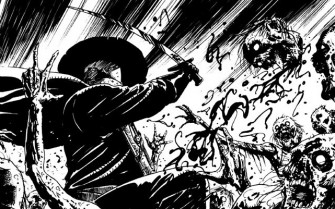 SPURGEON: The people I know into
SPURGEON: The people I know into Dredd
and the other 2000 AD
serials are fiercely devoted, and yet there never seem to be enough people like them to make the magazine even a modest hit in North America. I want to talk about the structural issues in the next question, but are there artistic reasons this material in general may not find a significant number of fans?
GOGGANS: That's a tricky question I've considered for years, and I've never quite found the answer. It's clear that
2000 AD's format of wild, over-the-top SF melodrama is one that just never found a broad market in this country. People do find it, but they didn't find it in the big numbers that were needed 20 years ago to make it a long-running, known hit property.
I think that when you're a teenager, you hit the point, for at least a few years, where you want to put away the superhero fight club comics. You start to see through them at the same time you discover kissing and your own music, not your parents'. I'm not suggesting
2000 AD is all that mature -- it can be shamelessly, stupidly, lovably adolescent -- but, as far as the North American comic experience goes, it doesn't really fit anywhere other than where it did in the '80s, when you could grow up from superhero fights to
Zot! and
Flaming Carrot and maybe
Cerebus or
Love & Rockets or
Neat Stuff. I don't think that "step-up" exists today. My son loves
Shaman King,
Naruto and all the other
Shonen Jump titles, and when he steps back from comics in a few years, as he invariably will, I wonder whether anything will be around to captivate him as an older teenager.
Maybe if the delivery system in the '80s had been better, or Titan Books' old line of reprints more attractive to this market, you'd see many more fans today. Many of the same late teen boys who fell in love with
Hopey and Maggie could have fallen in love with
Halo Jones and
Judge Anderson and there could be a much larger fanbase today.
 SPURGEON: How hard has Rebellion -- in addition to fans like yourself -- been hit by the current, half-cracked state of comics shop distribution? If I remember correctly, despite an aggressive trades program not all of the books they've done have even been offered here through Direct Market channels in the first place, let alone supported in a way that might allow them to build.
SPURGEON: How hard has Rebellion -- in addition to fans like yourself -- been hit by the current, half-cracked state of comics shop distribution? If I remember correctly, despite an aggressive trades program not all of the books they've done have even been offered here through Direct Market channels in the first place, let alone supported in a way that might allow them to build.
GOGGANS: It's been a disaster, Tom. I think a percentage of the blame is certainly Rebellion's, but the overwhelming bulk of the problem, lately, is
Diamond. I talk to shop owners all the time, and I really cannot understand how it's possible to screw up anything as simple as accepting deliveries and shipping them to stores. Diamond has really hurt small publishers like Rebellion and
Yen Press. Their
announcement about new minimums making life easier for retailers might as well have been made on an aircraft carrier with a "mission accomplished" banner.
It would be churlish to blame everybody else for
2000 AD's problems, so yes, the failure starts at home. Rebellion reminds me of
Bryan Ferry in 1972. He said that
Roxy Music was off to conquer America, and they spent four weeks opening for
Jethro Tull and
Ten Years After in towns like Augusta, Chattanooga and Fayetteville, then came home and complained that America didn't get it. You can't effectively promote your product, whatever your product, without spending money and grabbing every potential customer by the shirt collar and screaming at them, basically. Rebellion's never done anything so loudly, never signed on for
Free Comic Book Day or big ads in
Previews or any kind of retailer-focused initiative, and they've devoted their North American promotion squarely on
San Diego. I know Comic-Con is huge, but that's just a polite murmur if that's all you're going to do.
But really, it's Diamond where the current problem lies. Now, maybe if Rebellion had been buying full-page ads and making Diamond happy with ad revenue for the last few years it wouldn't have been a candidate for this year's purge, but who knows? It's still Rebellion's job to make people interested in their product, and they didn't do it. Yet for ages, buying
2000 AD, the
Judge Dredd Megazine and all the books was simple: Diamond shipped two issues of
2000 AD every other week. About once a year, they'd hiccup, skip a shipment and ship four the next time. Everybody was happy.
At some point last fall, the wheels went off. There'd be a six-week gap between issues and then four would show up. Six weeks later, the missing two would show up, along with two of the next four. It wasn't just my shop; I speak with fans all over the country and employees of several stores in this area. As far as
2000 AD is concerned, that ship list you see at Diamond's site does not reflect reality, and depending on which warehouse ships product, your store could be weeks ahead of or behind the listing. My wife and I took a honeymoon road trip up to Montreal and back this summer, just before the "prog packs" began, stopping in all sorts of comic shops, and there were issues available in Boston shops we never saw in any Atlanta store, and we got issues here that stores in other cities apparently didn't. In September '09, my shop received an issue from November '08 which I had picked up at Boston's
Million Year Picnic in July. This wasn't a reorder; Diamond just finally found a copy. Maybe I'll get the seven mid-2009 issues that I am still missing by next Halloween.
So to combat this problem -- a recent problem of their own bungling creation -- Diamond decided to start soliciting the prog in a monthly polybagged package of four-five issues. They don't ship them. Atlanta stores -- three of them anyway -- got the July-offered "September pack" the day before Thanksgiving. That's the day that Diamond's public ship list claimed we'd be receiving the "October pack," which
did arrive in Chicago stores. Here, it actually arrived the week before Christmas, when nothing was showing on the ship list.
The issue of missing books is another story. Diamond canceled orders for about a half-dozen trade paperback editions because those orders were low. That's unfortunate, but also, disagreeably, understandable. Even if they run a lousy business, Diamond still has a bottom line, and Rebellion didn't create any excitement or demand for those books.
There are several other titles, however -- Rebellion releases about two a month -- which Diamond never offered at all. I have also heard several complaints that Diamond doesn't keep enough stock of the books, forcing customers who do hear Rebellion's polite murmurs and want to try them out to wait for very long backorders.
All of the books -- and they're terrific books, beautifully designed and printed -- are available from British bookstores or Amazon UK, but I don't want to spend money there, I want to spend it at my "local" shop in Athens,
Bizarro Wuxtry, and give them my money. It's the best comic shop I've ever visited; only about two others come close. I could talk for hours about how wonderful Bizarro Wuxtry is, and how they deserve as much of my funnybook money -- and everybody else's -- as is feasible. But if Diamond won't give them the comics that I want to buy, I have no choice but to use the Internet to shop. It's ridiculous!
 SPURGEON: It was once suggested to me that John Wagner is the most under-appreciated mainstream comics writer of all time. Can you talk about some of his work in the magazine this decade? I'm thinking particularly of Origins, although if you have other works in mind, please expound.
SPURGEON: It was once suggested to me that John Wagner is the most under-appreciated mainstream comics writer of all time. Can you talk about some of his work in the magazine this decade? I'm thinking particularly of Origins, although if you have other works in mind, please expound.
GOGGANS: He's more than the most under-appreciated, I think he's just about the best, full stop. He may not always be my favorite -- he doesn't blow my mind or break my heart as often as
Grant Morrison or
Gilbert Hernandez -- but nobody's as consistent as John Wagner in bringing the quality. It's not only on
Judge Dredd, although he's been comparatively quiet this past decade, mainly working just on
Dredd and
Strontium Dog, which is also excellent. He's nowhere as proficient as he was in the '80s, when he and Alan Grant were co-writing about twelve scripts a week for four different weekly anthologies.
Origins is a really good place to start for modern Wagner, although I think it's less friendly to new readers than would be ideal. This was a lengthy epic which ran from the fall of 2006 to the spring of 2007, and finally explored the huge global wars that gave rise to the current "Dreddworld," with the
Mega-Cities and the judging system, in the 2070s, several years before the beginning of the comic. This story is told in fragments by various characters while Dredd and some associates carry out an important mission in the
Cursed Earth. While they're out in the desert, Dredd learns that he has a number of natural-born clone relatives, but they're all mutants and, consequently, it's illegal for them to enter his city, or anybody else's city for that matter. None of the Mega-Cities allow "genetic abnormalities."
By the end of the story, Dredd has realized that his world got pretty far away from
Chief Judge Fargo's hopes and dreams, and that the mutant laws are long overdue to be retired. So throughout 2007 and 2008, Wagner and the other
Dredd writers, most notably
Al Ewing, started exploring life in the city where mutants could finally live legally. Unfortunately, it's a powder keg of 400 million mostly unemployed, undereducated, lunatic bigots who've been told all their lives that muties are those terrible people who have to live in the desert, suddenly forced to share space with them. In a city where race, gender and sexual orientation stopped really mattering long ago, nobody ever really had to deal with hate crimes before, and Dredd chose to exhaust all his stock of goodwill and respect among the people and his fellow judges fighting for mutant rights.
The real heartbreak finally came this year: Dredd lost. He and
Chief Judge Hershey's regime are seen as failures and political embarrassments. So Hershey has been sent packing to a desk job on a frontier outpost on another planet and Dredd's been kicked into the desert to oversee some Mega-City-constructed townships for mutants, along with some failing, mediocre judges as his ineffective support staff. In other words, if the old man likes mutants so damn much, he can go live with them. They've even kicked out his protege to live and work there, to shove his legacy under the rug. Every bit of it, from the allegory of gay marriage being overturned by voters in Maine and California, to the effect it's had on characters we've grown to love, is heartbreaking and powerful stuff. I can't think of any other comic which has allowed a hero to lose so stunningly...
Well, it's not
all heartbreaking. Mega-City One's mayor is really a serial killer who Judge Dredd believes has been dead for years. That's pretty funny!
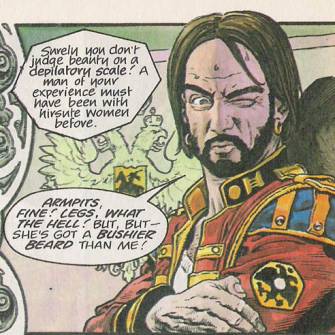 SPURGEON: It seems astonishing to me to be talking about
SPURGEON: It seems astonishing to me to be talking about 2000 AD
, with its particular publishing schedule and devotion to serial storytelling, when it seems like that was an outdated mode a couple of generations back. With trades collecting a lot of material, do you still think of 2000 AD
as the primary delivery method for these stories? Are there specific pleasures in that format you think other comics efforts could exploit on their own behalf?
GOGGANS: Andy Diggle famously described
2000 AD, at its best, as delivering you shot glasses of rocket fuel. You may not like every episode of every tale, but all five episodes each week should try and knock you on your backside with excellent characters in fast-moving, over-the-top stories. Nothing else in comics can give you that thrill, and it's the highwire, anything-goes
weekly nature that makes reading
2000 AD so fun.
Actually, something that came pretty close, to me, was
Kyle Baker's lovely, ridiculous Hawkman story in
Wednesday Comics, where the stakes and the scenario kept getting higher, dementedly so, every week. If DC would commit to publishing something like that every week, with a rotating, flexible lineup of stories and creators, not tied to continuity, I would consider buying it. That and
the Supergirl story by Jimmy Palmiotti and Amanda Conner were just hugely entertaining.
Really, with
2000 AD, the format is a big part of the fun.
Nikolai Dante,
Stickleback and
Savage would be among my favorite comics this decade regardless of how they're approached, but watching them unfold in cliffhanger fashion week-to-week is what keeps readers hooked. You can tell that some stories are "written for the trade" -- Pat Mills seems to design his storylines in 60-page chunks, rather than ten six-page episodes -- but there's a real sense of excitement to having stories come and go, with new talent trying out a
Future Shock in between larger epics.
And once you buy into the business of the comic being edited by a space alien who talks in far-out intergalactic slang, with druids sneaking office gossip into the copyright information each issue, you're in for a whole new layer of fun. I suppose
Mad is the only other comic that would promise readers that certain, unpopular writers won't be back because they've been fed to a maniacal garbage grinder.
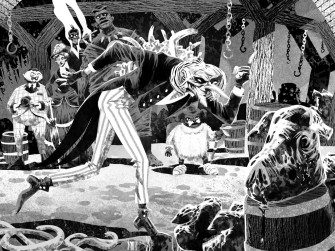 SPURGEON: Is
SPURGEON: Is 2000 AD
still published ten years from now? Will it ever be a hit in North America?
GOGGANS: Hopefully, and probably not.
Rebellion, sensibly, keeps quiet about the business end of things, but the feeling is that any international sales are just gravy to an operation that needs to perform strongly in Britain, on the newsstand and through subscriptions, which it seems to have done well for more than 30 years. Obviously an increased American presence could help their bottom line, but I wonder just how much is possible. It isn't very "hipster" of me, but I quite like minor league sports, and if you ever want a sobering reality check of how small and insular our hobby really is, try comparing those ICv2 sales estimates to the reported paid attendance of even small market teams. On Thanksgiving night, I watched a AA ECHL team in Duluth host a team from Charlotte with a crowd about the same size as
Savage Dragon's nationwide audience. In the direct market,
2000 AD apparently doesn't even sell the 3000 copies it seems to take to reach the bottom of that chart.
I think that it's certainly possible for
2000 AD to grow, but it will take a lot of work from Rebellion to finally capitalize on Judge Dredd's name recognition. However, with the Diamond situation as awful as it is, broader success probably won't come in the direct market, and so the public won't easily see, on a chart, whether they're successful at it. You can actually download the comic every week at
Clickwheel for less than Diamond charges for a physical copy, and get the full line of books from British sellers who keep it in stock, bypassing Diamond entirely. Unless, like me, you have tremendous loyalty to a much-loved comic store, there's no need to leave the house to get these comics at all.
Clickwheel is a very good delivery system. I've begun using it to read the prog week-by-week while hoping for the hard copies to show up for my library, and I like that they have many titles from several British small-press companies available. Rebellion was very forward-thinking in getting this system ready for digital delivery, but I fear it will be quickly swamped by
Longbox, should that get up and running, with its planned lower prices and broader selection. I hope that Rebellion is looking forward to the next platform after this. I wonder whether the next generation of Kindle or Nook will be set up for comics, and if so,
2000 AD should be ready for that.

There are probably other things that Rebellion could be doing to increase their characters' visibility. I suppose my opinion's not worth as much as a highly-paid marketing consultant, but maybe reaching around the direct market with lots more convention appearances is the right way to go. Finding some common ground with Grant Morrison to reprint
Zenith and even present new stories would be an enormous selling point. Announcing that, or similar projects, from panels at big American shows where there's lots of blogger media would be a great idea, rather than letting rumors slip out via Amazon advance listings, which seems to be how it goes today. Getting review copies of books to that same blogger media, to everybody with an audience, is another. Bringing back
Samantha Slade for a 26-week residency is another. Well, possibly not that last one, but it would make me very happy, anyway!
*****
*
2000 AD, Various, Rebellion, Tabloid, weekly.
*****
This year's CR Holiday Interview Series features some of the best writers about comics talking about emblematic -- by which we mean favorite, representative or just plain great -- books from the ten-year period 2000-2009. The writer provides a short list of books, comics or series they believe qualify; I pick one from their list that sounds interesting to me and we talk about it. It's been a long, rough and fascinating decade. Our hope is that this series will entertain from interview to interview but also remind all of us what a remarkable time it has been and continues to be for comics as an art form. We wish you the happiest of holidays no matter how you worship or choose not to. Thank you so much for reading
The Comics Reporter.
*
CR Holiday Interview One: Sean T. Collins On Blankets
*
CR Holiday Interview Two: Frank Santoro On Multiforce
*
CR Holiday Interview Three: Bart Beaty On Persepolis
*
CR Holiday Interview Four: Kristy Valenti On So Many Splendid Sundays
*
CR Holiday Interview Five: Shaenon Garrity On Achewood
*
CR Holiday Interview Six: Christopher Allen On Powers
*
CR Holiday Interview Seven: David P. Welsh On MW
*
CR Holiday Interview Eight: Robert Clough On ACME Novelty Library #19
*
CR Holiday Interview Nine: Jeet Heer On Louis Riel
*
CR Holiday Interview Ten: Chris Mautner On The Scott Pilgrim Series
*
CR Holiday Interview Eleven: Tim Hodler On In The Shadow Of No Towers
*
CR Holiday Interview Twelve: Noah Berlatsky On The Elephant And Piggie Series
*
CR Holiday Interview Thirteen: Tucker Stone On Ganges
*
CR Holiday Interview Fourteen: Douglas Wolk On The Invincible Iron Man: World's Most Wanted
*
CR Holiday Interview Fifteen: Jog On Death Note
*
CR Holiday Interview Sixteen: Ben Schwartz On BPRD
*****

*****
*****
posted 2:00 am PST |
Permalink
Daily Blog Archives
November 2019
October 2019
September 2019
August 2019
July 2019
Full Archives


